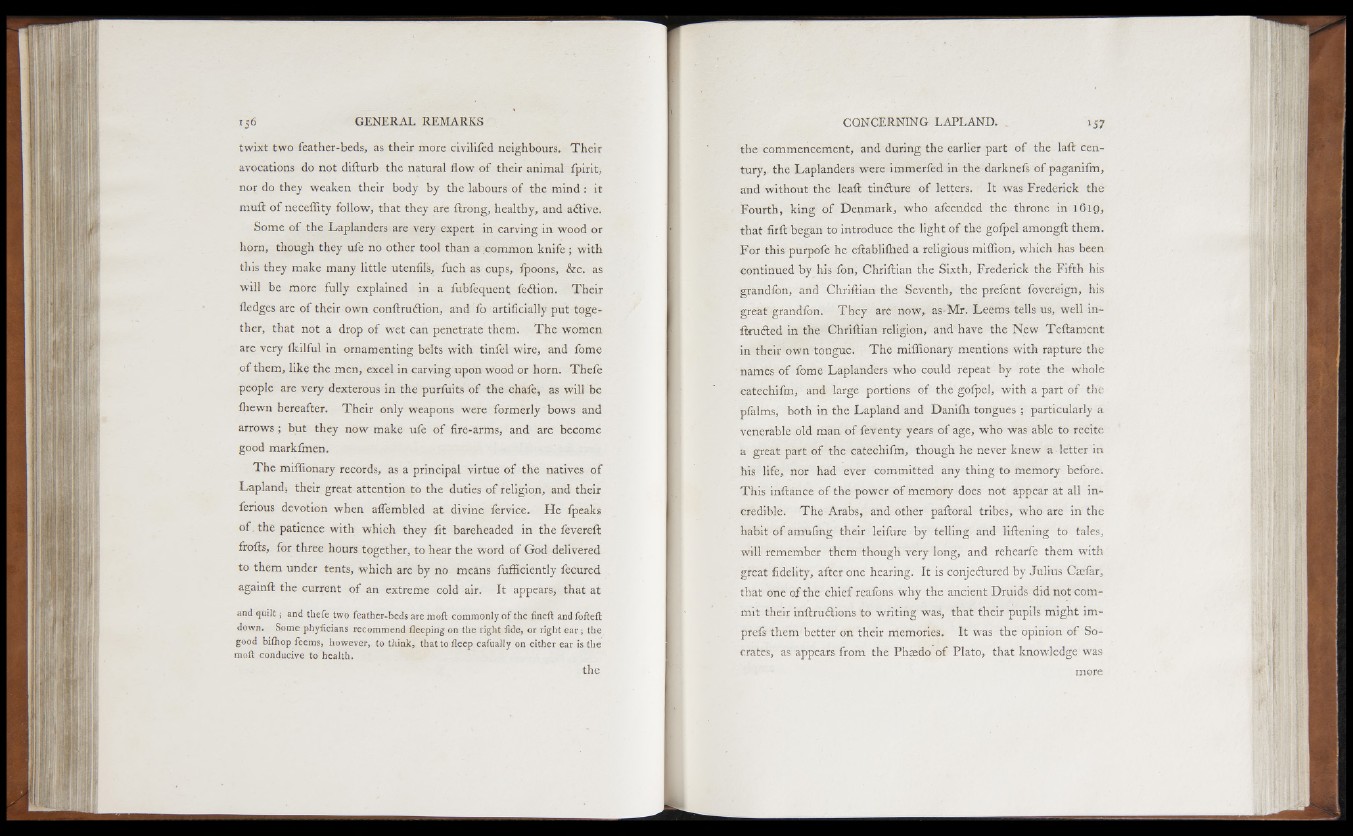
twixt two feather-beds, as their more civilifed neighbours. Their
avocations do not difturb the natural flow of their animal fpirit,
nor do they weaken their body by the labours of the mind : it
m u d of neceflity follow, that they are ftrong, healthy, and a ¿live.
Some of the Laplanders are very expert in carving in wood or
horn, though they ufe no other tool than a common knife ; with
this they make many little utenfils, fuch as cups, fpoons, &c. as
will be more fully explained in a fubfequent, fe¿lion. Their
fledges are of their own conftrudlion, and fo artificially put together,
th a t not a drop of wet can penetrate them. The women
are very Ikilful in ornamenting belts with tinfel wire, and fome
of them, like the men, excel in carving upon wood or horn. Thefe
people are very dexterous in the purfuits of the chafe, as will be
lhewn hereafter. Their only weapons were formerly bows and
arrows; but they now make ufe of fire-arms, and are become
good markfmen.
The miflionary records, as a principal virtue of the natives of
Laplandj their great attention to the duties of religion, and their
ferious devotion when aflembled at divine fervice. He fpeaks
of, the patience with which they fit bareheaded in the fevereft
froils, for three hours together, to hear the word of God delivered
to them under tents, which are by no means fufficiently fecured
againft the current of an extreme cold air. It appears, that at
and quilt; and thefe two feather-beds are II!oft commonly of the fineft and fofteil
down. Some phyficians recommend fleeping on the right fide, or right e a r; the
good biihop feems, however, to think, that to ileep cafually on either ear is the
moil conducive to health.
the
the commencement, and during the earlier part of the laft century,
the Laplanders were immerfed in the darknefs of paganifm,
and without the leail tindlure of letters. It was Frederick the
Fourth, king of Denmark, who afcended the throne in 1619,
th a t firft began to introduce the light of the gofpel amongft them.
For this purpofe he eilablilhed a religious million, which has been
continued by his fon, Chriftian the Sixth, Frederick the Fifth his
grandion, and Chriftian the Seventh, the prefent fovereign, his
great grandion. They are now, as-Mr. Leems tells us, well in-
fttucled in the Chriftian religion, and have the New Teftament
in their own tongue. The miflionary mentions with rapture the
names of fome Laplanders who could repeat by rote the whole
catechifm, and large portions of the gofpel, with a part of the
pfalms, both in the Lapland and Danilh tongues ; particularly a
venerable old man of feventy years o f age, who was able to recite
a great part of the catechifm, though he never knew a letter in
his life, nor had ever committed any thing to memory before.
This inftance of the power of memory does not appear at all incredible.
The Arabs, and other paftoral tribes, who are in the
habit of amufing their leiiure by telling and liftening to tales,
will remember them though very long, and rehearfe them with
great fidelity, after one hearing. It is conjeftured by Julius Caefar,
that one of the chief reafons why the ancient Druids did not commit
their inftrudlions to writing was, th a t their pupils might im-
prefs them better on their memories. I t was the opinion of Socrates,
as appears from the Pheedo of Plato, that knowledge was
more